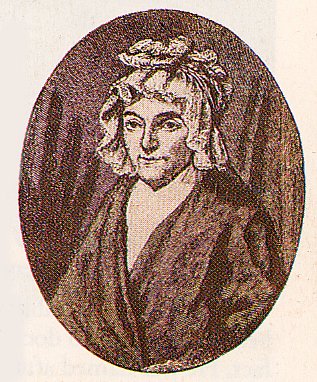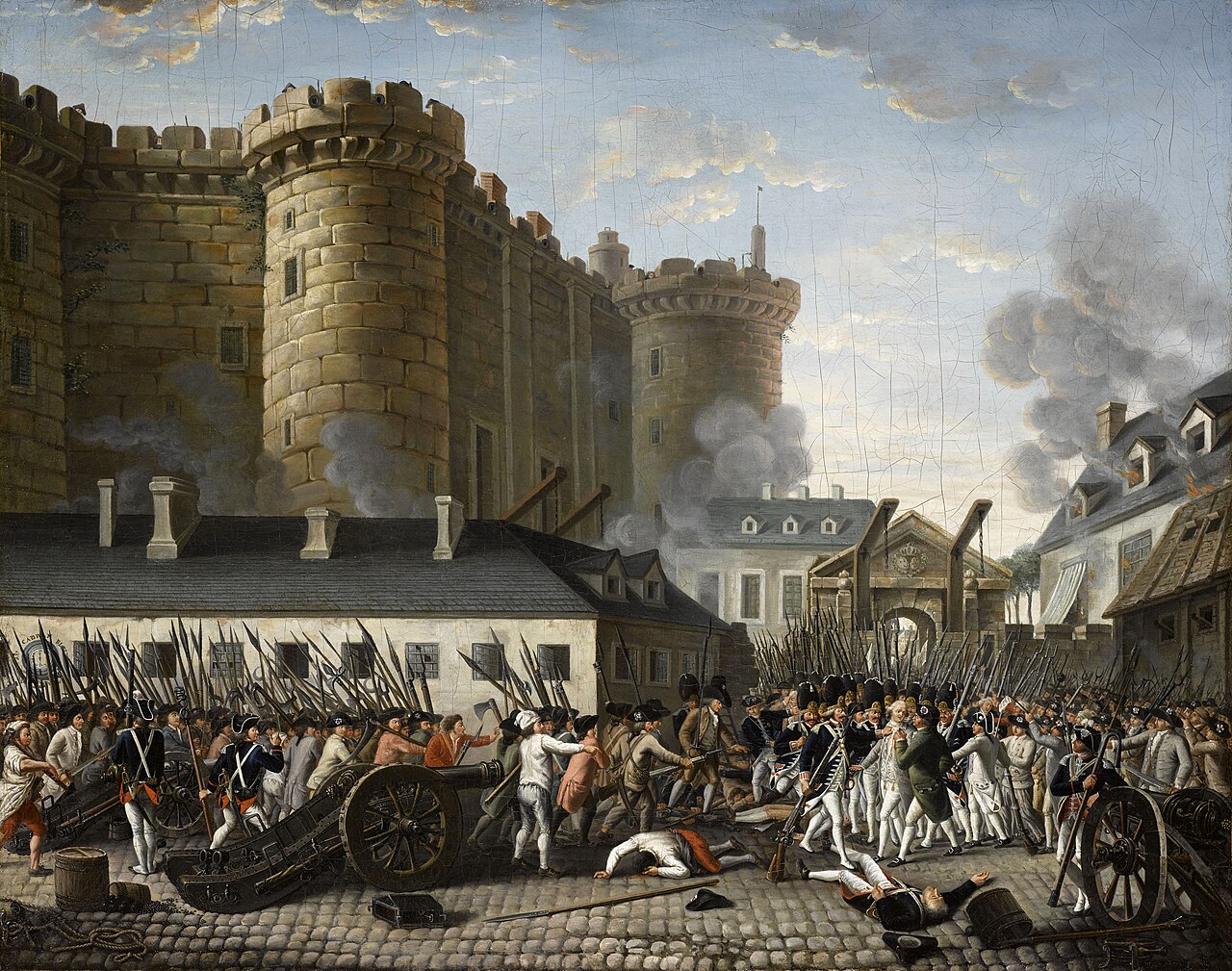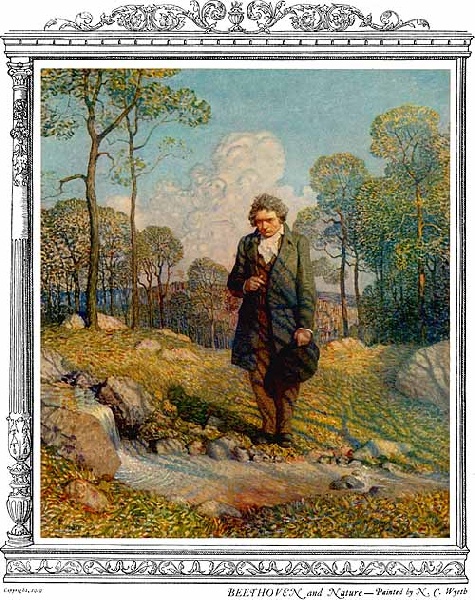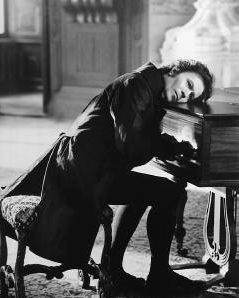
WATCH BEETHOVEN'S PICTURE BEING
"SPEED" PAINTED:

01. Beethoven had genius.
02. Genius possesses a man.
03. Born in Bonn, Germany 1770 from a musical family.

 |
| View of Bonn |

 |
| Bonn during Beethoven's Time Period |
04. There was a revolt in Europe. Aristocrats who ran Europe were on their way to collapse.
05. Grandfather Ludwig (his name sake) worked for the courts.

06. Johann (his father) tried to be Beethoven's piano teacher
but was cruel to him; beat him.


07. Johann wanted Beethoven to be a child prodigy like Mozart
and hoped to make money off of him.
08. Beethoven thought the world was a dangerous place and
felt it was dangerous to trust people.
He became a loner.
09. He threw all his efforts into playing the piano to escape the real world.
10. He quit school at age 10 to focus on his music.
11. The late 18th Century was known as the "Enlightenment Period" because during this time
the common people gained liberty from the aristocrats and were taking control over their own governments
(ideas advocated by the famous philosophers Voltaire and Kant).
12. Beethoven felt that music had the power to transform people and
should not be used purely for entertainment purposes.
13. Beethoven was inspired by his teacher Christian Neffe.


14. He was sponsored to go to Vienna, Austria, a famous city of the arts
centralized in Europe, where he could prove himself musically.




 |
| Vienna, 1850 |
15. People, during the Enlightenment, broke with old, conventional rules just
as Beethoven started to break with the old music styles.
16. During this time, Vienna was considered the musical and cultural capital of the world.

17. Beethoven wanted to meet and hoped to study with Mozart (who was living in Vienna).






After hearing Beethoven play Mozart was impressed and said,
"Watch out for this boy, one day he will give the world something to talk about."
18. Though Beethoven wanted to stay and study with Mozart
he was called home to take care of his sick mother.
 |
| Beethoven's Mother: Maria Magdalena Keverich (1746-87) |
When Beethoven finally was able to return to Vienna, years later, Mozart had died.
19. After his mother died his father took to drinking a lot and Beethoven
became the head of the family,
financially taking care of his father and brothers.
20. He worked at the Bonn court playing the viola.
 |
| Beethoven's Viola |
21. At this job he started to compose.
One piece, dedicated to Franz Joseph II (a leader in the Enlightenment),
 |
| Franz Joseph II of Austria |
was so difficult to play that some musicians refused to perform it.
22. It is thought that perhaps Beethoven wanted the performers to feel the same anguish as him.
To him the expression of the music came first and it was of no concern to him
if the performers found it hard to play.
23. During the French Revolution (1789) Beethoven's music embodied
the upheavals shaking Europe.
 |
| The Storming of the Bastille |
The aristocrats grip on power was collapsing.
24. Joseph Haydn, a famous Viennese composer and contemporary of Mozart,
offered to teach Beethoven in Vienna
(where aristocrats still were the major source for financial backing of the arts).


There Haydn could also introduce him to the people
who would be able to "bank roll" his career.
25. Beethoven wanted to get a reputation as a different musician.
His music was emotional; a style never heard before.
26. After obtaining financial backers for his music he made it clear that
he might be financially subsidized but he could not be bought.
He would not change his music for any amount of money.
27. Beethoven's, mood swings and temper were legendary; like his music.
28. He had a big ego and felt he was better than the aristocrats who sponsored him
although he would dedicate pieces to his patrons (sponsors).
29. He liked people to speculate that the name "van" in the middle of his name
meant he was of noble birth.
But, the "van" meant nothing of the sort.
("Von" means noble and "van" means common).
30. Just as he is beginning to get fame he starts to hear a "ringing" in his ears.
31. His first symphony was written at age 30.
32. He fell in love with one of his pupils
and wrote the famous "Moonlight Sonata" for her.

.jpg)

| Juliet Gvichchardi |
and wrote the famous "Moonlight Sonata" for her.

.jpg)

But, since she found out that Beethoven had no royal title
she left him and married a count 2 years later.
33. The ringing in his ears was the beginning of a hearing loss
that would progress eventually into deafness.
As the hearing loss worsened so did his raging temper;
becoming violent, abusive, and physical.
34. For a long time he would not tell anyone about his hearing problem.
35. He was terrified that he would lose his hearing and
knew when he couldn't hear the church bells ring near his house
that his hearing would soon be totally gone.
36. Music was Beethoven's therapy and he vented his rage through it.
During this time he wrote many fine compositions; he heard the music in his head.
37. Looking "fate" in the face he decided to use his disadvantages as his advantages.
38. Beethoven idolized Napoleon as an enlightened leader so he dedicated his third symphony to him.
When Napoleon took over France and declared himself Emperor,
Beethoven tore up the dedication and renamed the symphony "Heroic" or "Eroica."


39. As he became more deaf, he struggled to recapture the beauty of nature
with his sixth symphony called the "Pastoral."


He wanted the music to sound like things he would never hear again:
wind, bird songs, sunlight, storms, etc.
40. Beethoven was always falling in love with aristocratic women
who did not want to marry him because he was a commoner.
41. After he could not hear his own piano playing he quit performing
concerts and spent all his time composing.
42. To help him hear himself compose his seventh symphony
it is said that he resorted to placing his ear on the piano and even resorted to sawing
the legs of the piano in order to have the instrument close enough to the ground so he could
place his ear on the floor to hear the vibrations.

the legs of the piano in order to have the instrument close enough to the ground so he could
place his ear on the floor to hear the vibrations.

43. The deafer he became the more he withdrew within himself
and threw all his emotions into his music.
44. The idea of a free Europe where people could govern themselves
was the basis for his only opera called "Fidelio."

45. When Beethoven's brother died he wanted to get custody of his nephew
 |
| Nephew Karl van Beethoven (1806-1858) |
feeling that he could be the father he never had.
He battled in court for custody against the wishes of his family
during which he showed himself as a mean and selfish man
who became publically humiliated when it came out in trial that
he was not of noble birth as he had led everyone to believe.
46. After the court case, he became even more isolated and stopped taking care of himself.
Friends abandoned him and it seemed that his whole life was a mess.
But, as the outside was falling apart, his inside was writing the most beautiful music.
47. As his life is fell apart he turned to the church
and decided to write a Mass called the "Missa Solemnis."
He is used music to try to put all his thoughts and ideas in order;
to make sense of all that is happening to him.
 |
| Beethoven Composing Missa Solemnis |
48. At this time he also writes a series of string quartets.
49. By the time he writes his ninth (and last) symphony he is totally deaf.
It has passionate and optimistic music and uses the famous poem by Schiller,
"Ode to Joy,"
"Ode to Joy,"
setting it to music in the 4th movement and then adding a chorus
singing the poem's lyrics in an added 5th movement.
50. The poem "Ode to Joy" emphasizes brotherhood for all man kind.
51. This symphony was the first symphony to ever use a chorus
and adding a 5th movement to the normal 4 movement format was also unusual.
52. At the premier of the symphony Beethoven could not hear the audience applaud.
53. Beethoven got sick before he could write his tenth symphony.
54. He died raising his fist in the air just as thunder from a terrible storm was heard.
55. Beethoven was the most famous celebrity of his day;
a revolutionary hero and epitomized the struggle of an artist to overcome great odds
for the sake of his art, lifting himself up from agony through his music.
56. To many, he is the symbol of music; he is immortal.
57. Beethoven once said,
"Talent is what a man possesses,
genius is what possesses a man."
Beethoven was possessed.
58. Beethoven's hair, taken from his head after his death,
has been analyzed to determine the actual cause of his death which was lead poisoning.
TERMS/NAMES
TAKEN FROM THE FILM NOTES
Germany
Johann Beethoven
prodigy
Enlightenment Period
Voltaire
Kant
Christian Neffe
Austria
Bonn
viola
Franz Joseph II
French Revolution
Joseph Haydn
Mozart
Vienna
subsidized
patrons
von
van
Moonlight Sonata
Napoleon
France
Emperor
Heroic
Eroica
Pastoral
aristocratic
commoner
Fidelio
Mass
Missa Solemnis
string quartets
Schiller
Ode to Joy
genius
Beethoven:
Germany
Johann Beethoven
prodigy
Enlightenment Period
Voltaire
Kant
Christian Neffe
Austria
Bonn
viola
Franz Joseph II
French Revolution
Joseph Haydn
Mozart
Vienna
subsidized
patrons
von
van
Moonlight Sonata
Napoleon
France
Emperor
Heroic
Eroica
Pastoral
aristocratic
commoner
Fidelio
Mass
Missa Solemnis
string quartets
Schiller
Ode to Joy
genius
Beethoven:
The Sound and The Fury
A&E WORKSHEET
It is almost impossible not to have heard the stirring music composed by Ludwig von Beethoven.
His immortal compositions have survived for generations and are as much a part
of the modern world as they were almost two centuries ago.
But the beauty of Beethoven’s music was born a midst the darkness of a tortured soul.
This angry, belligerent, and hostile man lost his hearing before he was thirty,
yet continued to produce some of the world’s greatest music.
Beethoven: The Sound and the Fury would be useful for classes on
European History, Western Civilization, World Culture and Music.
It is appropriate for middle school and high school.
Vocabulary
Discussion Questions
- Beethoven was undoubtedly a genius. But what is genius? What is the price of genius? Who else in history has possessed genius?
- Beethoven’s father was an abusive alcoholic. How did Beethoven’s father and childhood affect Beethoven’s life and career?
- Beethoven was a surly, ill-tempered man. What were the roots of his bitterness and bad temper?
- Why is Beethoven’s music so difficult to play?
- Beethoven spent his life in the courts of Vienna but he was not a nobleman. Discuss the class implications of Beethoven’s life at court.
- Why was Beethoven embarrassed about his hearing loss?
- How does Beethoven’s music reveal his inner rage? Do you think his music would be different if his temperament had been different?
- Beethoven lost his hearing by the time he was thirty. How did this hearing loss affect him?
- How did he continue to compose such beautiful music despite his hearing loss?
- What was Beethoven’s contribution to the world of music?
Extended Activities
- Compare the music of Beethoven to the music of Mozart. What are the differences in their musical styles?
- You might not realize it, but you probably hear Beethoven’s music almost daily. Identify Beethoven’s music in everyday life.
http://www.aetv.com/class/admin/study_guide/archives/aetv_guide.0265.html
Learn about Beethoven's life "cartoon" style:
http://www.spike.com/video/tales-of-old-piano/2913282
BEETHOVEN WORKSHEET: ludwig_van_beethoven.doc
http://www.englishwordplay.com/beethoven.html
http://www.documentamusica.de/html/en-bio-beethoven.html
http://www.lvbeethoven.com/Cartes/Cards02BeethovensLifeItalian.html
http://simplyknowledge.com/biographies/ludwig-van-beethoven#.U-26p_ldV8E
http://markalburgermusichistory.blogspot.com/8770_12_01_archive.html
http://changeminds.wordpress.com/

BEETHOVEN WORKSHEET: ludwig_van_beethoven.doc
http://www.englishwordplay.com/beethoven.html
http://www.documentamusica.de/html/en-bio-beethoven.html
http://www.lvbeethoven.com/Cartes/Cards02BeethovensLifeItalian.html
http://simplyknowledge.com/biographies/ludwig-van-beethoven#.U-26p_ldV8E
http://markalburgermusichistory.blogspot.com/8770_12_01_archive.html
http://changeminds.wordpress.com/


